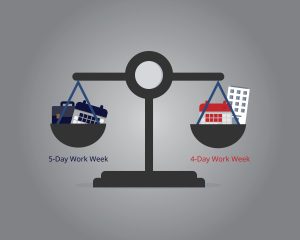By Nurul Wan Faisal & Lim Qi Han (BAC Apprentices)
It’s the middle of the week and we’re already dreaming of our weekends. We’ve all been there. We get burnt out so quickly yet still have two more working days to get through before officially clocking out.

Employers have standardised their employees to work a 40-hour week schedule, Monday to Friday. On an average day, this includes commuting, a one-hour lunch break and soggy packed lunches. For most of us, it means working in a small cubicle and being stuck in traffic, just to make it in time for dinner.
To combat this fatigue, the Reykjavik city council and national government conducted a social experiment from 2015 – 2019, allowing 1% of the population to work for only four days of the week. This meant that employees worked from Monday to Thursday whilst taking the rest of the week off.
Not to be mistaken for a ‘compressed schedule,’ the four-day work week emphasises on working for less days and less hours for the same pay. A true four-day work week means capping the number of hours to around 30 hours a week without adding more, to ‘compensate’ for the loss of hours.
By the end of the trial, workers reported feeling less stressed and burnt out; that their work-life balance improved, and they also reported having more time to spend with family, nurturing new hobbies or learning new skills.
Aside from Iceland, countries like Japan, Spain, Sweden and New Zealand have all conducted, and, or, are open to discussions of a four-day work week. Germany, which already has the shortest average working week, have also had calls to reduce hours even further.
A research conducted by the University of Massachusetts, Amherst found that there were also environmental benefits to a four-day work week. Reduced working hours meant less time commuting by car or public transport. According to the study, workers could reduce their carbon footprint by 14.6% for every 10% less we spend working in offices.
Another study from Autonomy found that enjoying a three-day weekend could reduce UK carbon emissions by 117 thousand tons of CO2 per week. That is the equivalent of removing 1.3 million cars off the road every year.

A four-day working week encourages a more sustainable lifestyle and economy. With more free time, people are more likely to make environmentally positive choices, such as cycling and walking instead of driving, cooking with fresh ingredients rather than eating at the office, and using less packaging and plastic utensils which are detrimental to the environment. Employees are also more likely to feel well-rested and more productive in the long-run, resulting in better workplace culture and economic growth.
With all these benefits, you might wonder why we still have yet to make this fully operational? Concerns have been raised that a ‘compressed schedule’ may be promoted in disguise of a four-day weekend, pushing more employees to work longer hours in reward for an extra day off. There are also concerns of reduced customer satisfaction with nobody working on Fridays to attend to their needs.

Countries and companies worldwide have been discussing the shift to a four-day week for years, even after the success of numerous trials. After experiencing a pandemic, people are now rethinking how we work.
The five-day work schedule was introduced in the early 20th century, but is this form of working still relevant in today’s fast paced and digital society?
As the world regains its footing, perhaps it is time to embrace unorthodox but sustainable forms of working as the new norm. It might be the right move in creating a thriving and prosperous economy.

